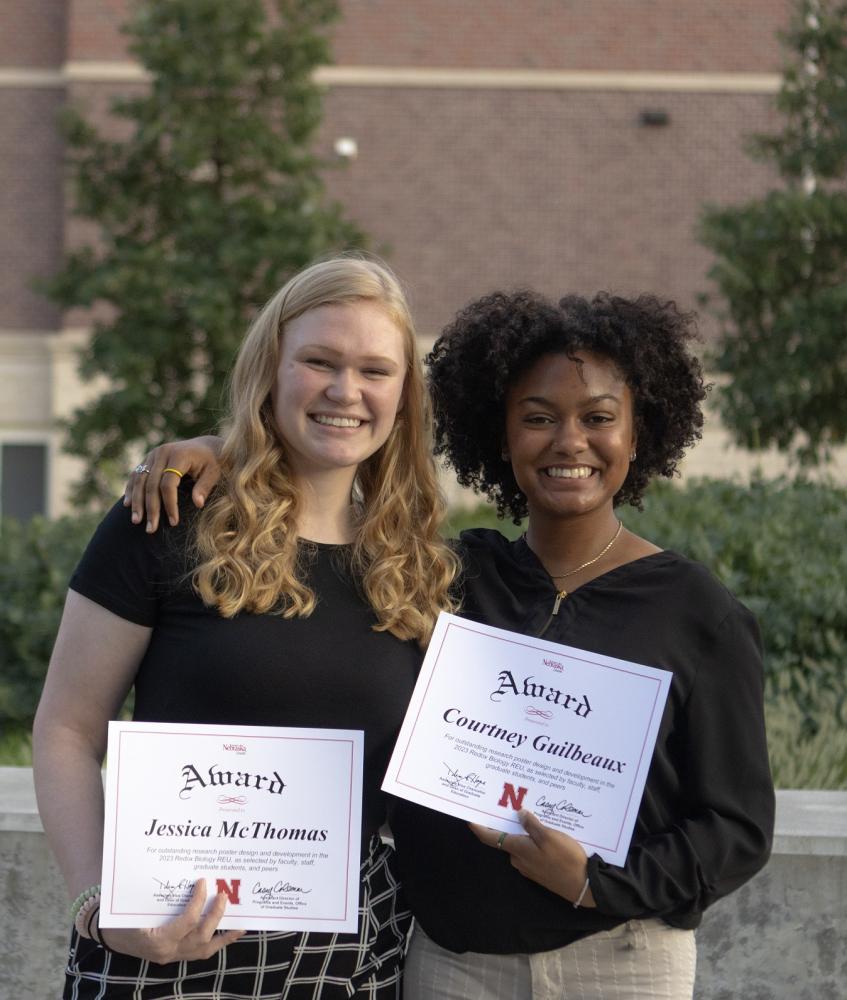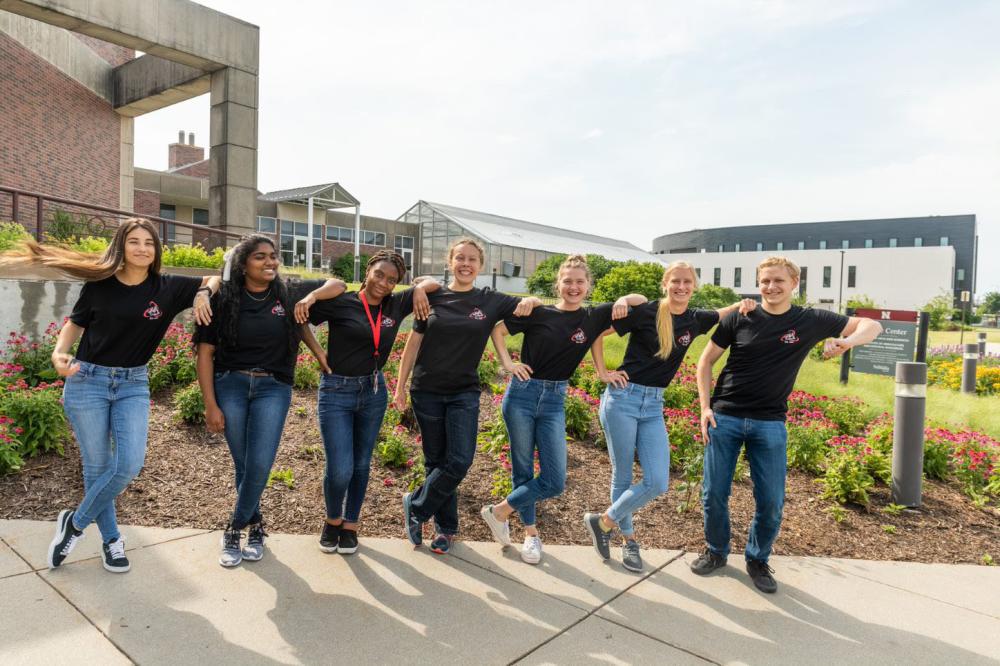
For information contact
Redox Biology Coordinator
Funding Source

Who should apply
Related fields
- Biochemistry
- Biophysics
- Cellular Biochemistry
Eligibility
Participation in the Nebraska Summer Research Program is limited to students who meet the following criteria:- U.S. Citizen or Permanent Resident
- Current undergraduate with at least one semester of coursework remaining before obtaining a bachelor's degree
See Eligibility for more information.
How to apply
Follow the application steps to submit the following materials.
About the Program
The Nebraska Redox Biology Center at the University of Nebraska Lincoln offers qualified undergraduates an opportunity to pursue independent research projects in redox biochemistry. Research areas range from molecular medicine to environmental biochemistry and plant biochemistry. Students will participate in exciting projects at the cutting edge of research in redox biology. They will formulate and test hypotheses, develop experimental problem-solving skills, and receive training in biochemical, biophysical and molecular biology techniques.
The ten-week summer program is sponsored by the National Science Foundation and will place the student with a faculty mentor in whose lab the student's research project will be pursued. The student will participate fully in the life of the mentor's lab. In addition, there will be informal meetings of all program participants to exchange information on the research being done and to discuss areas of biochemistry/redox biology that are of particular interest and excitement. There will also be weekly meetings in which various scientists describe the latest advances in their own research or career opportunities in biomedical or biotechnology fields.

Benefits
- Competitive stipend: $7,000
- Suite-style room and meal plan
- Travel expenses to and from Lincoln
- Campus parking and/or bus pass
- Full access to the Campus Recreation Center and campus library system
- Wireless internet access
Learn more about academic and financial benefits.
Events
- Department orientation
- Department seminars and presentations
- Professional development workshops (e.g., applying to graduate school, taking the GRE)
- Welcome picnic
- Day trip to Omaha's Henry Doorly Zoo and Aquarium
- Outdoor adventures
- Research symposium
Mentors and Projects
Dr. Donald Becker Department of Biochemistry
Redox metabolism and enzymology
The overall goal of our research is to understand the mechanisms of metabolic enzymes and how metabolism impacts stress response and the intracellular redox environment. Of particular focus is on the metabolism of the amino acid proline. Students in our lab will gain experience in techniques for purifying and characterizing proteins and enzymes, cell culturing, and biophysical methodologies.
Dr. Lindsey Crawford Department of Biochemistry
Viral control of stem cell fate
Our lab studies how viruses manipulate the human immune system. Specifically, we are focused on how common human herpesviruses infect and control hematopoietic stem cells (the foundational cell for the immune system). Projects in the lab address fundamental questions about viruses, stem cells, and immune system development; and students will learn to use tools and techniques from biochemistry, virology, immunology, and stem cell biology.
Dr. Liangcheng Du Department of Chemistry
Discovery of new antibiotics
REU students will learn how to isolate and identify new bioactive natural products from underexplored microorganisms. They will be exposed to techniques in microbial fermentation, metabolite analysis, biosynthetic gene identification and mutation, cloning and expression, biosynthetic enzyme activity assay, and metabolic pathway engineering. The outcomes will contribute to the on-going fight against multidrug-resistant pathogens.
Dr. Rodrigo Franco Department of Veterinary and Biomedical Sciences
Redox homeostasis and energy metabolism
The Franco lab aims to understand the signaling mechanisms by which cellular metabolism, redox homeostasis and signaling regulate cellular fate. Mitochondrial dysfunction, alterations in protein quality control mechanisms and the activation/impairment of cell death pathways (apoptosis, necrosis and autophagy) have been associated with the etiology of human diseases. Energy failure and oxidative stress have been implicated in the induction of cell death, but the molecular mechanisms that link redox homeostasis and cellular metabolism to the activation of cell death pathways remain elusive. Our primary focus is to understand molecular mechanisms of neurotoxicity associated with environmental exposures, neurodegeneration, brain ischemia, and viral infections.
Dr. Katarzyna Glowacka Department of Biochemistry
Redox regulation of photosynthesis processes
Plants experience rapid fluctuations in the light, resulting from both cloud and leaf movements. In the absence of buffering mechanisms, rapid increases in light intensity can produce singlet oxygen and other reactive oxygen species (ROS) that can damage cells. Plants have evolved non-photochemical quenching (NPQ) to safely dissipate excess energy absorbed as heat. Uniquely, NPQ is regulated by redox and regulates the redox of other proteins including the first stable acceptor of the electron transport chain, quinone A (QA).
Dr. Yihe Huang Department of Biochemistry
Cryo-EM studies of transmembrane signaling in human health and diseases
Transmembrane proteins are a crucial class of biomolecules that span the cell's lipid bilayer and play pivotal roles in cellular communication, transport of molecules, and signal transduction. These proteins are embedded within the cell membrane, with parts of their structure situated on both the extracellular and intracellular sides. The Huang lab use single-particle cryo-electron microscopy (cryo-EM) to comprehend the molecular mechanisms of transmembrane signaling at the atomic level. Redox modification of specific amino acids can induce changes in protein structure, affecting their capacity to transport molecules, transmit signals, or interact with other molecules.
Dr. Oleh Khalimonchuk Department of Biochemistry
Redox regulation of mitochondrial processes
The Khalimonchuk laboratory seeks to understand processes that preserve normal mitochondrial functions during homeostatic challenges such as changes in nutrient availability, oxidative damage, and protein misfolding. The current research focus is to delineate the roles of several conserved redox-regulated proteases that are critical for mitochondrial protein quality control and energy metabolism. REU students will investigate mitochondrial proteases such as metallopeptidase Oma1 and serine proteases CLPXP and LACTB to elucidate the mechanisms of redox-tuned activation of mitochondrial protein quality control.
Dr. Jaekwon Lee Department of Biochemistry
Mechanistic insights into homeostasis of inorganic elements
Dr. Lee's research program focuses on identifying and characterizing molecular factors involved in the homeostasis (uptake, utilization, and detoxification) of inorganic elements and their functional roles in fungi and mammals. Inorganic elements are vital to sustaining all living organisms by supporting numerous biological processes, such as energy generation, membrane potential, and signaling; therefore, their deficiency and toxicity are associated with critical issues we have faced, such as food production and human and animal health. Dr. Lee's group has cloned copper, cadmium, and potassium transporters and elucidated their functions, action mechanisms, and regulation.
Dr. Xinghui Sun Department of Biochemistry
Protein post-translational modification in cell death and vascular homeostasis
Sun’s group is interested in elucidating the uncharacterized role of protein neddylation in regulating cell death, redox homeostasis, and vascular integrity. Protein neddylation is one type of post-translational modification that regulates protein function and stability. Sun lab employs various approaches including molecular and cellular techniques, mouse models of human diseases, immunohistochemistry, multi-omics (e.g., genomics, transcriptomics, proteomics), and bioinformatics to discover new knowledge in biochemistry, vascular biology, and human diseases, which provides an excellent training opportunity for students interested in basic biomedical research.
Dr. Mark Wilson Department of Biochemistry
Time-resolved structural biology of redox-related proteins
A primary goal of the Wilson laboratory is to understand the physical basis of enzyme catalysis and protein signaling using time-resolved X-ray crystallography, cryo-EM, and other biophysical techniques. The advent of X-ray free electron laser (XFEL) sources and high resolution cryo-EM provides two distinct approaches for the detailed structural characterization of biochemical phenomena at multiple timepoints after perturbation. With these time-resolved “movies” of proteins in action, the Wilson lab investigates the non-equilibrium structural biology of several systems, including cysteine-dependent enzymes that form mandatory covalent reaction intermediates, proteins involved in antibiotic synthesis and destruction, and proteins that are important in redox biochemistry.
Dr. Tatsuya Yamada Department of Biochemistry
Nexus of brain and liver - Physiological regulation of energy metabolism
The regulation of energy metabolism occurs seamlessly within our body. Multiple organs work together without our conscious awareness, supplying energy to sustain life in various environments and diverse circumstances. Yamada Laboratory is dedicated to achieving a comprehensive understanding of physiological energy metabolism. Our research focuses on the interaction between the brain and the liver, since the brain is the conductor of the physiological system, while the liver plays a key role in regulating its metabolism.
Dr. Limei Zhang Department of Biochemistry
Structures and mechanisms of metalloproteins
Transition metals play essential roles in a broad range of biological processes and are widely used in bacteria as redox stress sensors. A major research goal of the Zhang group is to develop a better mechanistic understanding of the structure and function of metal-binding proteins at the atomic level using molecular biological, structural, and spectroscopic approaches. REU students will be involved in various aspects of the structural and functional characterization of these metal-binding proteins.